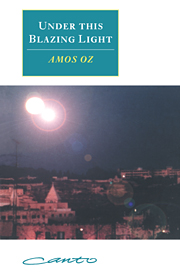Book contents
- Frontmatter
- Contents
- Translator's note
- Preface to the Hebrew edition
- Introduction
- Events and books
- Under this blazing light
- ‘Man is the sum total of all the sin and fire pent up in his bones’
- ‘A ridiculous miracle hanging over our heads’
- The State as reprisal
- A modest attempt to set out a theory
- The meaning of homeland
- The discreet charm of Zionism
- A.D. Gordon today
- Thoughts on the kibbutz
- The kibbutz at the present time
- How to be a socialist
- Munia Mandel's secret language
- Pinchas Lavon
- The lost garden
- An autobiographical note
- An alien city
- Like a gangster on the night of the long knives, but somewhat in a dream
- Notes
- Publication history
- Index of names
Thoughts on the kibbutz
Published online by Cambridge University Press: 07 September 2010
- Frontmatter
- Contents
- Translator's note
- Preface to the Hebrew edition
- Introduction
- Events and books
- Under this blazing light
- ‘Man is the sum total of all the sin and fire pent up in his bones’
- ‘A ridiculous miracle hanging over our heads’
- The State as reprisal
- A modest attempt to set out a theory
- The meaning of homeland
- The discreet charm of Zionism
- A.D. Gordon today
- Thoughts on the kibbutz
- The kibbutz at the present time
- How to be a socialist
- Munia Mandel's secret language
- Pinchas Lavon
- The lost garden
- An autobiographical note
- An alien city
- Like a gangster on the night of the long knives, but somewhat in a dream
- Notes
- Publication history
- Index of names
Summary
In the beginning there were some impassioned souls who lifted up their eyes to the reform of the world. The blazing faith of religious men, the sons and grandsons of religious men, generations upon generations of passion and persistence. These sons had lost their religious faith and abandoned the religious commandments, but they had not given up their devotion and drive and their thirst for the absolute: to be attached to a single, great, final and decisive truth, that found detailed expression in innumerable rules and regulations, both great and small, in everyday life. They had ceased to be religious according to the religious law, but in a new way they continued to be pious and even messianic. And when they came to the Land of Israel and set up the first kibbutzim, their ideals were like a fire in their bones.
They found a hard and alien land, very remote from the ‘land our fathers loved’ portrayed in sentimental songs, the opposite of the ‘land of eternal springtime’ of which Bialik's bird sang, a parched contrast with the fairytale land they had imagined from the stories of their childhood in the snow-bound shtetl, that land of sunshine, of almonds and raisins, of the seven biblical species, the land of Mapu's ‘Love of Zion’ and the verses of the Hibbat Zion (Love of Zion) movement, of the olivewood camels of the Bezalel Art School and the pictures of the Jewish National Fund.
They came to a bare and baring land, where the harsh climate and the grinding toil and the loneliness of the whispering nights stripped a man naked of every possible disguise.
- Type
- Chapter
- Information
- Under this Blazing Light , pp. 119 - 124Publisher: Cambridge University PressPrint publication year: 1995



